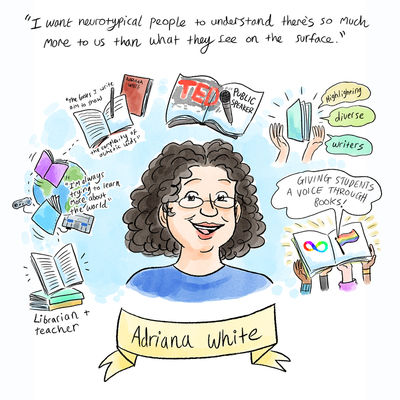(TEDx Talks) In this talk, Adriana White discusses the idea of neurodiversity. Many people are labeled incorrectly because their brains are wired differently. Adriana offers awareness and an alternative way to see people as unique and valuable, regardless of their near-diversity.

 www.spectrumlife.org
www.spectrumlife.org
We all know someone who’s a little weird. Someone who’s a little too eager, a little too enthusiastic. Someone who doesn’t get the hint when you want the conversation to end, so you have to plan your escape. Someone who might think that you're on closer terms than you actually are. Someone who has very specific interests and thinks that you are just as interested in all the same things that they like.
We all know someone like this, right?
We all know someone who’s a little awkward.
Well, what if I told you that some people who strike you as weird or awkward - they’re not suffering from any kind of moral or character flaw? What if I told you that some people seem different to you because they are literally wired differently?
Conditions like autism, ADHD, dyslexia, and tourette syndrome all fall under the umbrella of something called neurodiversity. The people who have these conditions are united by the fact that their brain structure is physically different, and that difference in wiring leads to different ways of thinking, communicating, and experiencing the world. One of the main ideas behind neurodiversity is that different does not mean broken.
The term was created by a sociologist named Judy Singer in the 1990s to refer to the infinite and naturally occurring variability of the human brain, because we all have our own unique neurology, and with it, our own strengths and weaknesses. The problem for a lot of neurodivergent people is that the world we live in was created with neurotypical brains in mind. And as a result of this, neurodivergent people have to put in extra work, constantly translating their thoughts and ideas and experiences from one frame of reference to another.
Things are getting better. We know more about conditions like autism than ever before. We’re getting better at diagnosing various forms of neurodivergence, and we’re getting better at creating more accessible environments that work better for everyone. But that’s not what I’m here to talk to you about tonight.
I’m here to talk to you about the weird kids, the quiet ones, the ones who sit by themselves. The kids who overreact or underreact or just act strangely. The kids whose classmates will sometimes say to them, “Why are you doing that? Why are you being so weird?” The kids whose teachers sometimes will even say, “You know, they’d have more friends and they wouldn’t get bullied quite so much if they just made a little effort to not be quite so weird.”
As a middle school librarian, I really relate to those quiet, weird kids that I work with because I was one of them. I ate lunch by myself a lot, usually outside because the cafeteria was too bright and too loud and just too overwhelming. I often only had one friend, and I spent a lot of time in the library, which may explain how I ended up as a school librarian. But I also had these unexpected, over-the-top meltdowns caused by sensory overload that were frequently misinterpreted to be intentional temper tantrums. I struggled with changes in routine, and I didn't know how to begin or end a conversation.
But since I did well in school, nothing really happened. I was never recommended for an autism diagnosis as a kid. My parents did have my hearing checked when I was five because my mom complained that I never answered when she called for me. She’d have to physically enter my line of sight for me to realize that she was talking to me, but I passed that hearing test with flying colors, and that was the end of it. My parents did not know what autism was.
In the 1980s and the 1990s when I was a kid, autism was something that was predominantly diagnosed in young white males who couldn’t speak. So being a Puerto Rican and Mexican-American girl who spoke relatively well, I didn’t really have the traits that people associated with autism at the time. It would take over 30 years for someone to make the connection. After five years of teaching special education and working with neurodivergent students every day, I learned that I had secretly been one of them all along. I’m part of what researchers call “the lost generation of autism.”
The phrase was coined in 2015 by researchers at the University of Cambridge to refer to a lot of different people: women, people of color, trans and non-binary people, all of whom had their autism go unnoticed and undiagnosed for decades. Instead, many of us were just seen as weird. And that lack of a diagnosis has had a severe impact on our lives. It has affected our mental health, our relationships, and even our career prospects.
The National Autistic Society in the UK estimates that 85% of autistic college graduates are unemployed. Only about 10% of us might be married, based on studies from the University of Toronto and the University of Wisconsin in Madison. The Centre for Addiction and Mental Health in Toronto found that autistic people are five times more likely to be diagnosed with conditions like anxiety and depression. And the Karolinska Institutet in Sweden has found that autistic people are 10 times more likely to die by suicide. The trauma that leads someone to take their own life is not something that happens overnight. It is the result of years of feeling misunderstood and feeling like you are misunderstanding everyone else.
As neurodivergent people, we constantly contort ourselves to fit the expectations of neurotypical society. We constantly bend to meet the standards and the rules of the people around us, but eventually if we’re not properly supported, we break. My friend Scott used to read the phone book as a kid. I read the encyclopedia, but he really liked numbers, and Scott was a bit of a weird kid that grew up to be a bit of a weird adult. He struggled to maintain relationships, but he was never diagnosed with any kind of neurodivergent condition.
After knowing Scott for more than a decade, I began to suspect that he might be wired differently, like me. But what I didn’t know was how much he was struggling all on his own because like so many other neurodivergent people, Scott was suffering in silence. He put on a mask, a facade, of being perfectly fine while simultaneously he was growing to believe that the world would be a better place without him. The pandemic was Scott's breaking point. He died by suicide last October. And the world is worse off because he's gone.
Just as a rainforest with biodiversity is better equipped to adapt and respond to threats, humanity needs neurodiversity. We all benefit when we have different kinds of minds solving our problems, creating our works of art, and enriching our communities. But even if a neurodivergent person is not out there changing the world, their life still has value. We talk so much as a society about the importance of kindness, but far too many of us will distance ourselves from people we don’t really understand. We tell autistic people that they need to learn better social skills, but bridging that gap between autistic and non-autistic people can’t fall solely on our shoulders, because when we’re dealing with things like anxiety or depression or suicidal thoughts, we don’t have that much left to give. We need you to meet us halfway.
So tonight, I’m asking you to rethink the word “weird.” Take that letter E and move it down just a couple of spots, and you’ll end up with “wired,” and that’s the word I want you to take home with you tonight. The next time you meet someone who strikes you as weird or strange, I want you to remind yourself: their brain is probably wired a little differently than mine, and that’s OK. They might be neurodivergent, they might have post-traumatic stress disorder, they might have some other condition, but you don’t need to know their exact diagnosis to be more compassionate and patient and understanding. We will all ultimately benefit from a world that is more empathetic and kind, and the neurodivergent kids that I work with every day - they deserve to live in that kind of world. They deserve so much more than what my generation had. So let’s work together and make this world a better place for all of us. Thank you.

A Day in the Life of Adriana White
Adriana White is a well-educated librarian, children’s book writer, and former special education teacher. She was diagnosed with autism and anxiety when she was in her 30s, and has used that information to make sense of her life’s experience ever since.
 www.spectrumlife.org
www.spectrumlife.org

